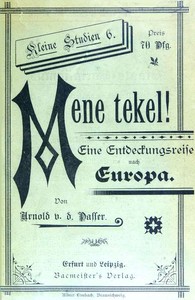Mene tekel! Eine Entdeckungsreise nach Europa by Arnold von der Passer
"Mene tekel! Eine Entdeckungsreise nach Europa" by Arnold von der Passer is a speculative fiction work written in the late 19th century. The narrative unfolds in a future where a flourishing, socialist state has emerged in Africa, named the Freilandstaat, which contrasts sharply with the devastated and desolate state of Europe. The book delves into themes of societal transformation, exploring visions of a dystopian Europe versus an idealized socialist community, all while
depicting various characters grappling with the implications of these changes. The opening of the narrative sets the stage in the year 2398, where the Freilandstaat celebrates its 500th anniversary with a grand event in the capital, Thomasville. At this celebration, Professor Bellmann delivers a speech reflecting on the achievements of their society and hints at the ominous state of Europe, hinting at its decline and the abandoned colonies. Following the celebration, the Freiland fleet embarks on a journey to re-establish contact with Europe, only to discover the shocking ruins of formerly thriving cities like Hamburg, now overrun by nature and devoid of life. This juxtaposition serves as a stark commentary on the consequences of capitalism and the hope embodied in the Freilandstaat's socialist ideals. As the expedition progresses, the characters face challenges that further emphasize the transformation of both continents, framing the narrative's exploration of societal values and the human condition. (This is an automatically generated summary.)
Read or download for free
| Reading Options | Url | Size | |||
|---|---|---|---|---|---|
| Read now! | https://www.gutenberg.org/ebooks/56991.html.images | 230 kB | |||
| EPUB3 (E-readers incl. Send-to-Kindle) | https://www.gutenberg.org/ebooks/56991.epub3.images | 262 kB | |||
| EPUB (older E-readers) | https://www.gutenberg.org/ebooks/56991.epub.images | 262 kB | |||
| EPUB (no images, older E-readers) | https://www.gutenberg.org/ebooks/56991.epub.noimages | 158 kB | |||
| Kindle | https://www.gutenberg.org/ebooks/56991.kf8.images | 345 kB | |||
| older Kindles | https://www.gutenberg.org/ebooks/56991.kindle.images | 322 kB | |||
| Plain Text UTF-8 | https://www.gutenberg.org/ebooks/56991.txt.utf-8 | 206 kB | |||
| Download HTML (zip) | https://www.gutenberg.org/cache/epub/56991/pg56991-h.zip | 242 kB | |||
| There may be more files related to this item. | |||||
Similar Books
About this eBook
| Author | Passer, Arnold von der, 1851-1917 |
|---|---|
| Title | Mene tekel! Eine Entdeckungsreise nach Europa |
| Credits |
Produced by Jens Sadowski and the Online Distributed Proofreading Team at www.pgdp.net |
| Reading Level | Reading ease score: 67.5 (8th & 9th grade). Neither easy nor difficult to read. |
| Language | German |
| LoC Class | PT: Language and Literatures: Germanic, Scandinavian, and Icelandic literatures |
| Subject | Utopian fiction |
| Category | Text |
| EBook-No. | 56991 |
| Release Date | Apr 17, 2018 |
| Copyright Status | Public domain in the USA. |
| Downloads | 269 downloads in the last 30 days. |
| Project Gutenberg eBooks are always free! | |

